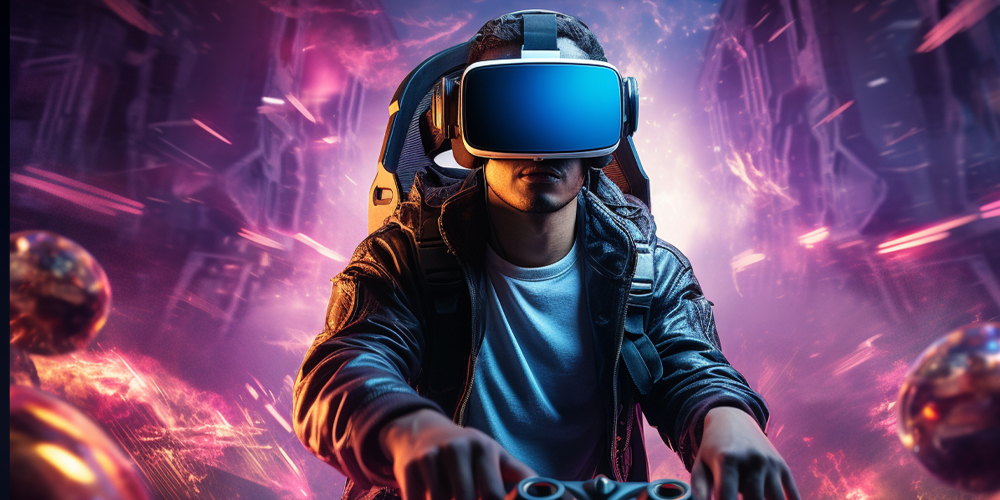The Future of Gaming: How Technology is Redefining Player Experiences
The gaming industry is experiencing a profound transformation. Technology is reshaping how players engage with games, offering unprecedented levels of immersion, interactivity, and accessibility. As we delve into the future of gaming, we will explore several key technological innovations and their impact on player experiences. From realistic graphics to advanced AI, the landscape of gaming is rapidly evolving.
1. Immersive Graphics and Realism
One of the most striking advancements in gaming is the enhancement of graphics. High-definition visuals, coupled with realistic animations, elevate the gaming experience to new heights. Game developers leverage powerful engines like Unreal Engine and Unity to create stunning environments that draw players in.
Ray Tracing: A New Era of Realism
Ray tracing technology simulates how light interacts with objects in a scene, creating breathtakingly realistic lighting effects. This technology allows for true-to-life reflections, shadows, and depth perception. Players can now enjoy environments that feel tangible and alive, greatly enhancing immersion.
Impact on Gameplay
Enhanced graphics not only serve aesthetic purposes but also significantly impact gameplay. Realistic environments immerse players, making them feel part of the game world. This heightened sense of presence can deepen emotional connections to characters and narratives, creating a more engaging experience.
Moreover, developers are now able to craft detailed landscapes that encourage exploration and discovery. Players are rewarded for venturing off the beaten path, finding hidden treasures or engaging with environmental storytelling.

2. Virtual Reality (VR) and Augmented Reality (AR)
Virtual Reality and Augmented Reality technologies are at the forefront of gaming innovation. These technologies create unique interactive experiences that blur the line between reality and the virtual world.
The Rise of VR Gaming
VR gaming allows players to step into fully immersive environments. With headsets like Oculus Rift, HTC Vive, and PlayStation VR, players can explore digital worlds in ways that were previously unimaginable. They can physically move, interact, and feel a part of the action.
Popular VR Games
Titles such as Beat Saber and Half-Life: Alyx showcase the potential of VR. These games offer experiences that traditional gaming cannot replicate. Players find themselves fully engaged, resulting in higher levels of satisfaction and emotional investment.
Additionally, VR technology is being used in training simulations, allowing users to practice skills in a risk-free environment. This application is particularly valuable in fields such as medicine and aviation, where precision is crucial.
AR in Gaming
Augmented Reality, on the other hand, brings digital elements into the real world. Games like Pokémon GO exemplify this technology, allowing players to interact with virtual creatures in their physical environment. This innovative approach encourages social interaction and outdoor exploration.
AR games create a new layer of gameplay that encourages players to move around their real-world surroundings, leading to healthier lifestyles while playing. As developers continue to explore AR possibilities, we can expect even more creative and engaging experiences.
3. Artificial Intelligence in Gaming
Artificial Intelligence is revolutionizing game design in numerous ways. AI enhances non-player characters (NPCs), making them more responsive and lifelike. This advancement creates a dynamic gaming environment where players experience unpredictable interactions.
Adaptive Gameplay
AI can analyze player behavior to adjust the difficulty of a game in real-time. This adaptability ensures that players remain challenged without feeling overwhelmed. Such tailored experiences can improve player retention and satisfaction.
For example, in racing games, AI can adjust the skill level of opponents based on the player’s performance. If a player consistently wins, the AI can ramp up the difficulty to keep the game engaging.
AI-Driven Storytelling
AI also influences narrative design. Games can now generate unique storylines based on player choices. This personalization fosters deeper engagement, making each playthrough feel distinct.
For instance, titles like Detroit: Become Human employ branching narratives that react to player decisions. This level of interactivity allows players to experience multiple outcomes, enhancing replayability and emotional investment.
4. Cloud Gaming: Access Anywhere
Cloud gaming is changing how players access games. This technology allows gamers to stream titles without the need for powerful hardware. Players can enjoy high-quality games on various devices, from smartphones to smart TVs.
Benefits of Cloud Gaming
Cloud gaming eliminates the need for physical copies and large downloads. Players can jump into games instantly, which enhances the overall gaming experience and attracts a broader audience.
Moreover, this technology allows players to switch devices seamlessly. A player can start a game on their console, pause, and continue on their mobile device without losing progress.
Popular Cloud Gaming Services
Services like Google Stadia, NVIDIA GeForce Now, and Xbox Cloud Gaming are leading the charge. These platforms allow players to access a vast library of games without needing expensive consoles or PCs.
As internet infrastructure improves globally, the potential for cloud gaming expands, making high-quality gaming accessible to more people.
5. Social Gaming and Community Engagement
Social gaming has gained immense popularity in recent years. Multiplayer games foster connections among players, allowing them to engage with friends and strangers alike. This social aspect enhances the gaming experience.
Online Multiplayer Games
Titles like Fortnite and Call of Duty: Warzone exemplify the success of online multiplayer. Players team up to complete missions, compete, and share experiences. This interaction creates a sense of community that enhances enjoyment.
Moreover, in-game events and collaborations foster a shared experience. Players come together to participate in challenges, tournaments, or seasonal events, enhancing community bonds.
Streaming and Content Creation
The rise of platforms like Twitch and YouTube Gaming allows players to share their experiences. Content creators foster communities around their channels, making gaming a shared experience. This engagement keeps players coming back for more.
Streamers often interact with their audience in real time, creating a sense of connection that enhances viewer investment. This interactivity can influence game popularity, making streamers powerful voices in the gaming community.
6. The Role of Blockchain in Gaming
Blockchain technology is making its way into gaming. This innovation offers secure ownership of in-game assets through non-fungible tokens (NFTs). Players can buy, sell, and trade these assets, creating a new economy within games.
Digital Ownership
Blockchain ensures players have true ownership of their items. Unlike traditional gaming models, where developers retain control, blockchain empowers players. This shift can lead to new revenue streams and opportunities for developers.
For example, players can earn real money by trading unique in-game items. This model incentivizes players to engage more deeply with the game and fosters a vibrant community.
Impact on Game Development
Developers can create unique experiences by incorporating blockchain. Games like Axie Infinity allow players to earn real money through gameplay. This model incentivizes players and fosters a vibrant community.
Moreover, blockchain can enhance transparency in gaming, ensuring fair distribution of profits and reducing fraudulent activities.

7. The Future of Gaming Interfaces
Advancements in user interfaces are redefining how players interact with games. From motion controls to voice commands, the possibilities are expanding.
Gesture-Based Controls
Motion-sensing technology enables players to control games with gestures. Systems like the Nintendo Switch’s Joy-Con offer intuitive gameplay experiences. This innovation makes games more accessible to a wider audience.
Games designed for gesture-based controls often encourage physical activity, blending gaming with fitness in an engaging way.
Voice Commands
Voice-activated controls are gaining traction in gaming. Players can issue commands without using a controller. This hands-free interaction enhances immersion, allowing for a more engaging experience.
As voice recognition technology continues to improve, we can expect to see even more sophisticated integrations in future games.
8. The Integration of 5G Technology
The advent of 5G technology promises to revolutionize gaming experiences further. With faster download speeds and lower latency, players can expect smoother gameplay and quicker matchmaking.
Enhanced Mobile Gaming
5G allows for more complex mobile games that can compete with traditional console experiences. Players can enjoy high-quality graphics and multiplayer interactions on their smartphones.
Improved Online Play
Lower latency improves online play, making competitive gaming fairer and more enjoyable. Players can respond to in-game events in real time, enhancing the overall experience.
Conclusion
The future of gaming is bright, driven by technological innovations that redefine player experiences. From immersive graphics to AI-driven storytelling, the landscape is evolving rapidly. As gaming technology continues to advance, players can expect even more exciting and engaging experiences.
Embracing these changes will not only enhance gameplay but also foster deeper connections within the gaming community. The possibilities are endless, and the journey has just begun. Whether you’re a casual gamer or a hardcore enthusiast, the future holds incredible potential for everyone involved in the world of gaming











